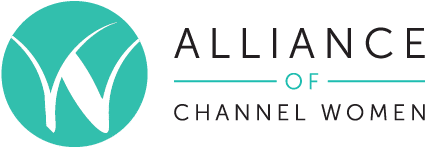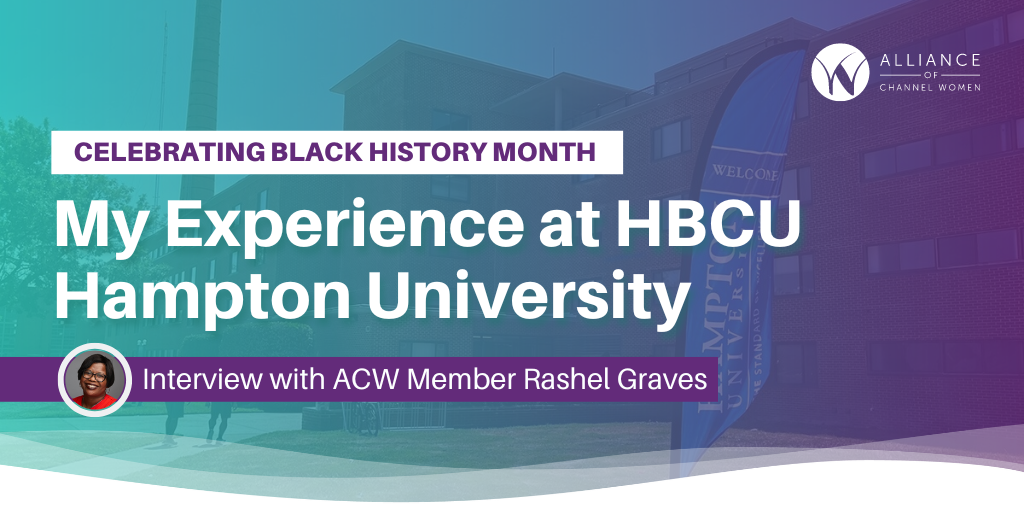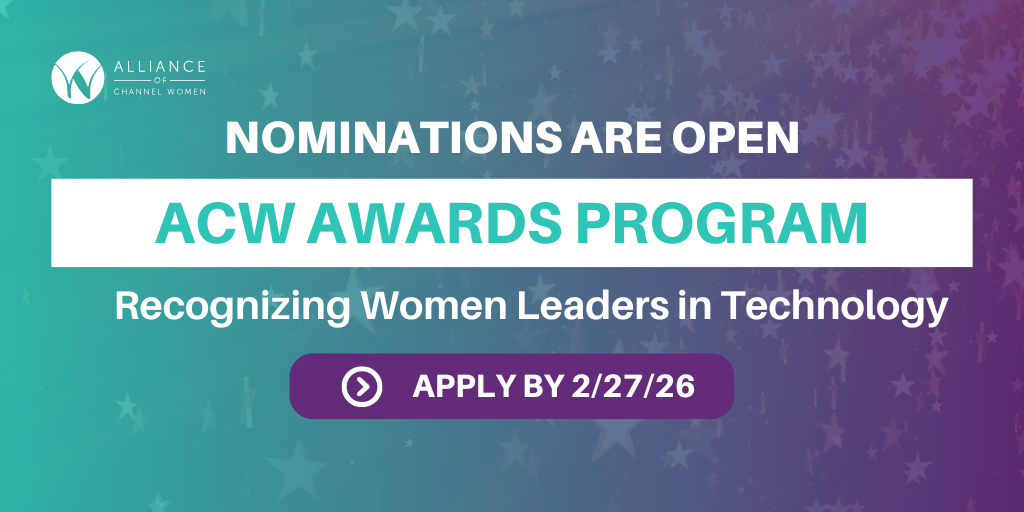To celebrate Black History Month and the contributions and legacy of African Americans, ACW is highlighting historically black colleges and universities (HBCUs) and ACW members who attended them.
In this blog, ACW Member Rashel Graves, Senior Director, Channel Programs and Enablement at Verizon, shares her experience at Hampton University.

Rashel Graves
Can you share a pivotal moment from your time at Hampton University that shaped your career in the tech industry? How did your experiences prepare you for the challenges and opportunities you encountered in your professional journey?
For my entrepreneurial class, we were asked to identify a potential business idea. The idea my team came up with involved implementing a digital method for sending targeted greeting cards and finding methods to transition storytelling experiences to digital platforms. We wanted to have a low-cost model while figuring out how to make sure it was accessible to everyone. We had to present it to a local bank and build a go-to-market plan for the idea.
This project was pivotal for a few reasons. One, it required forward thinking and using technology to solve a problem. At the time, I did not view myself as someone who would pursue a career in technology or channel, but I had a vision of what could be possible by bringing the right resources together. Also, it reminded me that as we work on solutions to advance, we have to remember those who do not have the means and ensure we are doing everything to reduce the digital divide.
While we did not pursue the business idea, we did watch many companies go to market with the concept, and eventually, this practice became widely accepted. Fast forward to today, I often remind myself to try to approach every situation by asking: What’s going on? What might we do about it? What are all the possible options to make it happen?
What unique perspectives or skills do you believe HBCU graduates bring to the tech sector, and how have these qualities contributed to your success in your current role?
In general, HBCUs focus heavily on nurturing students to think about more than academics. For example, how to prepare to be competitive, dress, present yourself, work with others for shared success and put in the work to be successful in any career. I don’t think this is unique to the tech sector. I know my classmates and I often talk about how we were more prepared for working in Corporate America because of the values and push we received from our professors to always show up as the best version of ourselves.
Reflecting on your career trajectory, what role did mentorship or support networks from your HBCU community play in helping you navigate the tech industry? Are there specific mentors or professors who had a significant impact on your development?
Mentorships and support networks played a critical role in my journey. I had one particular professor in school who always pushed me. In order to do well in her class, you had to not just perform well on tests but go to events outside of class and participate in class discussions. Her projects were geared toward real-world skills. She became one of my biggest cheerleaders and opened doors for internships and opportunities for employment. Even in my professional career, I still use the coaching from her class and appreciate that she saw a future for me that I didn’t see for myself at the time.
I cannot overstate how important the support networks have been and continue to be. Hampton teaches a family atmosphere where we take pride in helping other Hamptonians. While at school, it really was about how we can succeed together and when companies would visit, professors would ensure we were well prepared to have a competitive advantage. I still keep up with many classmates. In fact, some work with me today, and many have done extremely well in career advancement. We have a network where alumni connect to find ways to not only help each other but bring other students into the company and help mentor. I recognize that my success today has been because others have invested in me and helped make me better. It’s crucial that I do the same and find a way to help bring others up with me.
In what ways do you leverage your platform and influence as an HBCU alumna/alumnus to advocate for diversity and inclusion within the tech industry? Can you share any initiatives or projects you’ve been involved with that promote equity and representation?
I have been involved in programs at work to recruit — not just from Hampton but other HBCUs. I have been involved in initiatives aimed at raising awareness about the necessity of expanding the schools we collaborate with and our recruitment methods within those schools. I’ve attended multiple college fairs and interviewing preparation sessions. I’ve also participated in activities to meet with parents and students and share experiences to help students better prepare to transition from school. As an alumni, I have continued to participate in alumni activities to help bring awareness to school needs and support recruitment initiatives to help high school students gain insights into my HBCU experience.
Reflecting on your journey from Hampton University to your current role in the tech industry, what do you believe are the most significant obstacles or challenges that HBCU graduates face in entering and advancing within the tech sector? How can HBCUs and the broader tech community work together to address these barriers and create more opportunities for underrepresented talent?
One of the most significant barriers is having more opportunities to compete. While HBCUs known for engineering or other specialties will get exposure, it may not equal that of larger schools. More widely known universities often have larger endowments and strong alumni networks. This does not necessarily equate to having a more qualified or prepared employee. It is important that not just alumni, but the larger tech community, find ways to highlight the talent at these schools and existing partnerships and consider working with HBCUs for new partnership ideas. You might be amazed at the ideas that will come forward if given a chance.
About Hampton University
Founding: Hampton University, originally named Hampton Normal and Agricultural Institute, was founded in 1868 by General Samuel Chapman Armstrong as a school to educate freed men. Booker T. Washington, a notable African American educator, served as a faculty member at Hampton from 1872 to 1875 before founding the Tuskegee Institute in Alabama.
Civil Rights Era: Hampton University played a significant role in the Civil Rights Movement, hosting events featuring prominent figures such as Martin Luther King Jr. and Malcolm X during the 1960s.
Integration: Hampton was among the first historically black colleges and universities (HBCUs) to admit students of all races after desegregation in the 1960s.
University Status: In 1984, Hampton Institute officially became Hampton University, reflecting its expanded academic programs and university-level status.
Notable Alumni
Booker T. Washington: Although not a graduate, Booker T. Washington’s early teaching experience at Hampton greatly influenced his educational philosophy and subsequent founding of Tuskegee Institute.
Wanda Sykes: Comedian, actress and writer Wanda Sykes graduated from Hampton University in 1986, earning a bachelor’s degree in marketing.
Ruth Carter: Ruth Carter, an Academy Award-winning costume designer known for her work in films like “Black Panther” and “Malcolm X,” graduated from Hampton University in 1982.
Learn more about Hampton University by visiting its website: https://home.hamptonu.edu/about/


